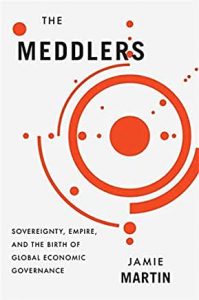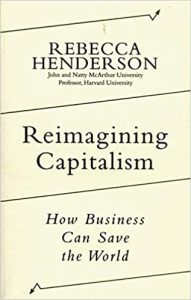Global governance is understandably something of a preoccupation as economic globalisation seems to be in retreat at the same time that the scale and intensity of global challenges – climate change, the AI race, actual or simmering conflict, organised crime – is increasing. The Bretton Woods institutions – IMF and World Bank – established in the wake of World War Two remain important and powerful, and will have a lot on their plates in the next year or two, including the possibility of a new debt crisis alongside a surge in poverty and hunger. This context raises two questions. One is what is their guiding philosophy in terms of economic analysis and policy recommendations going to be now the old Washington Consensus version of conditionality has been more or less ditched? The other is whether they can help address the new kinds of challenges, or whether instead new institutions are needed?
They were forged out of a crisis of course, but in The Meddlers: Sovereignty, Empire and the Birth of Global Economic Governance Jamie Martin traces their forbears in the international economic institutions established near the beginning of the 20th century. The key issue he highlights is on the one hand the delicate balance between mutually beneficial co-ordination and voluntary loss of sovereignty among peer countries, and on the other the exercise of power by some countries over others (Imperial powers over colonies or later the US over its debtors) at the expense of the latters’ sovereignty. Co-ordination and co-operation require ceding some decision-making ground but when there is a parity of power this expands the opportunities or benefits each party experiences. However, the international institutions also embed inequalities of power – symbolised by the Asian crisis image of an IMF bureaucrat (Michel Camdessus) leaning over a local politician (Indonesia’s President Suharto) signing up to loan conditions.
Some technocratic institutions governing for example international post or shipping have lasted throughought the century plus, while the BIS (established in 1929/30) is an interesting example of an organisation with a broader mandate yet lasting throughout the 20th century and beyond, despite its missteps during the 1939-45 conflict. Other pre-WW2 international bodies such as the Economic and Financial Section of the League of Nations fell with the implosion of the international order at the outbreak of war. The book argues that the context of post WW1 reparations, the tensions in the European empires, the growth of US economic power and the pressures of the gold standard and the tariff wars of the 1930s all contributed to their downfall. International co-ordination was both essential and impossible.
The lesson for the 21st century, it concludes, is that today’s context of shifting economic power and economic crisis pose similar challenges for the Bretton Woods institutions. The history of earlier institutions suggests that it is fundamentally hard to resolve the core dilemma of a need for co-operation with the desire for sovereignty in a world of unequal power: “Tweaks to existing international institutions, like the IMF and World Bank, may be insufficient to produce a more stable reconciliation of global governance and democratic politics.” But what form should new institutions take? This very interesting book leaves the question hanging.






